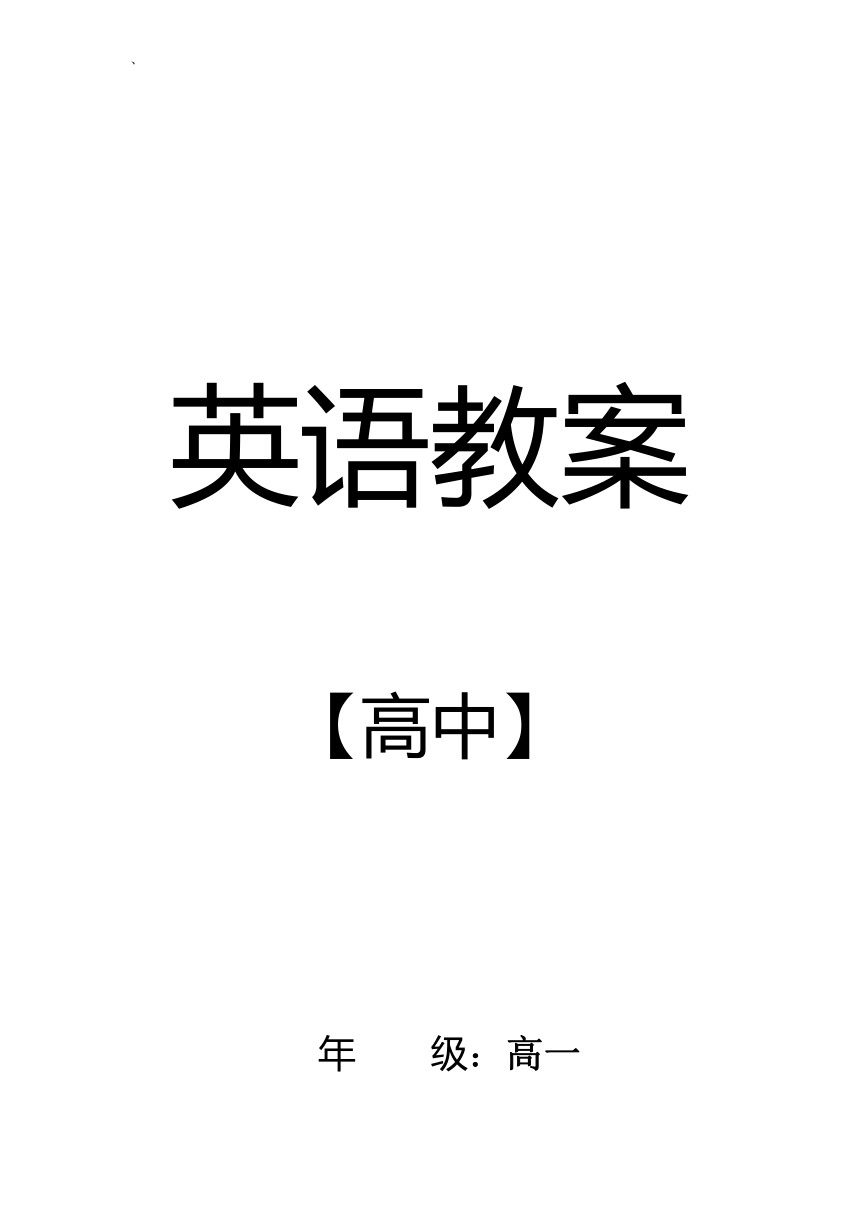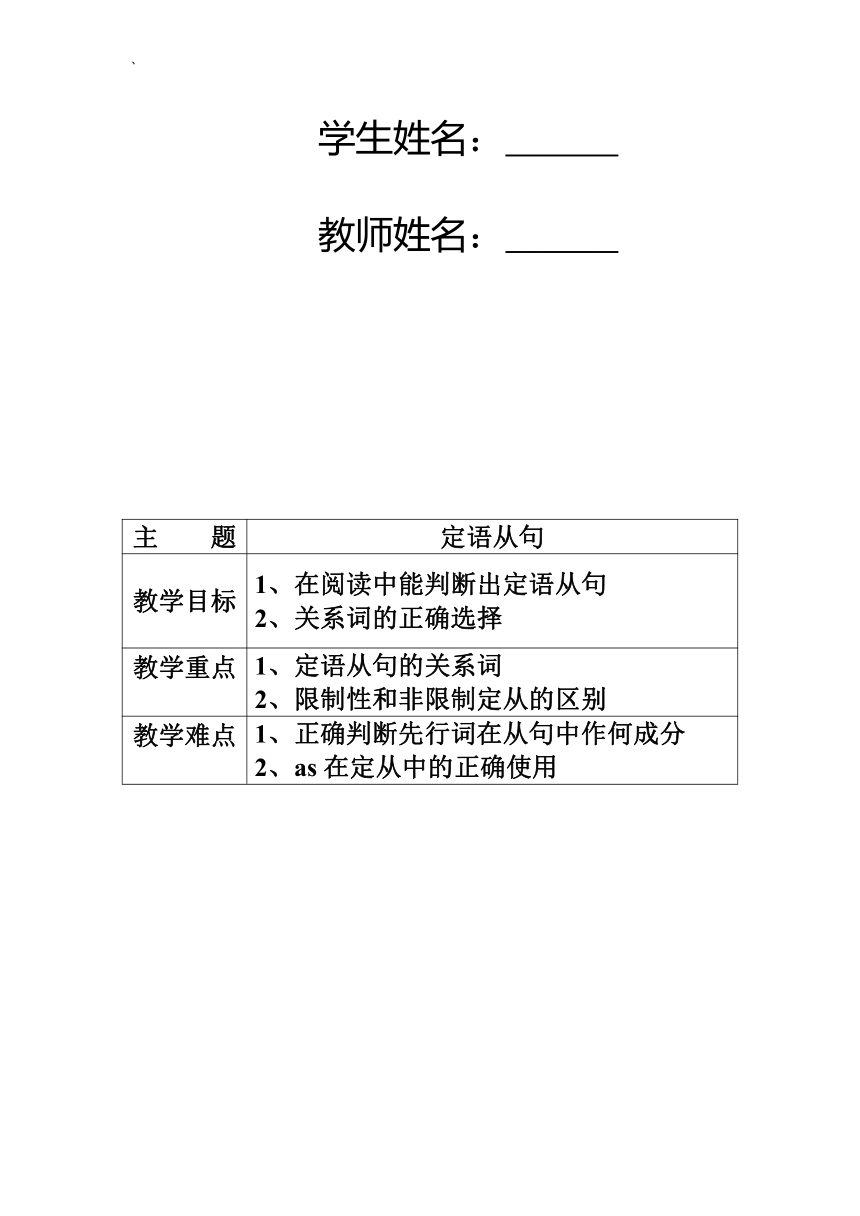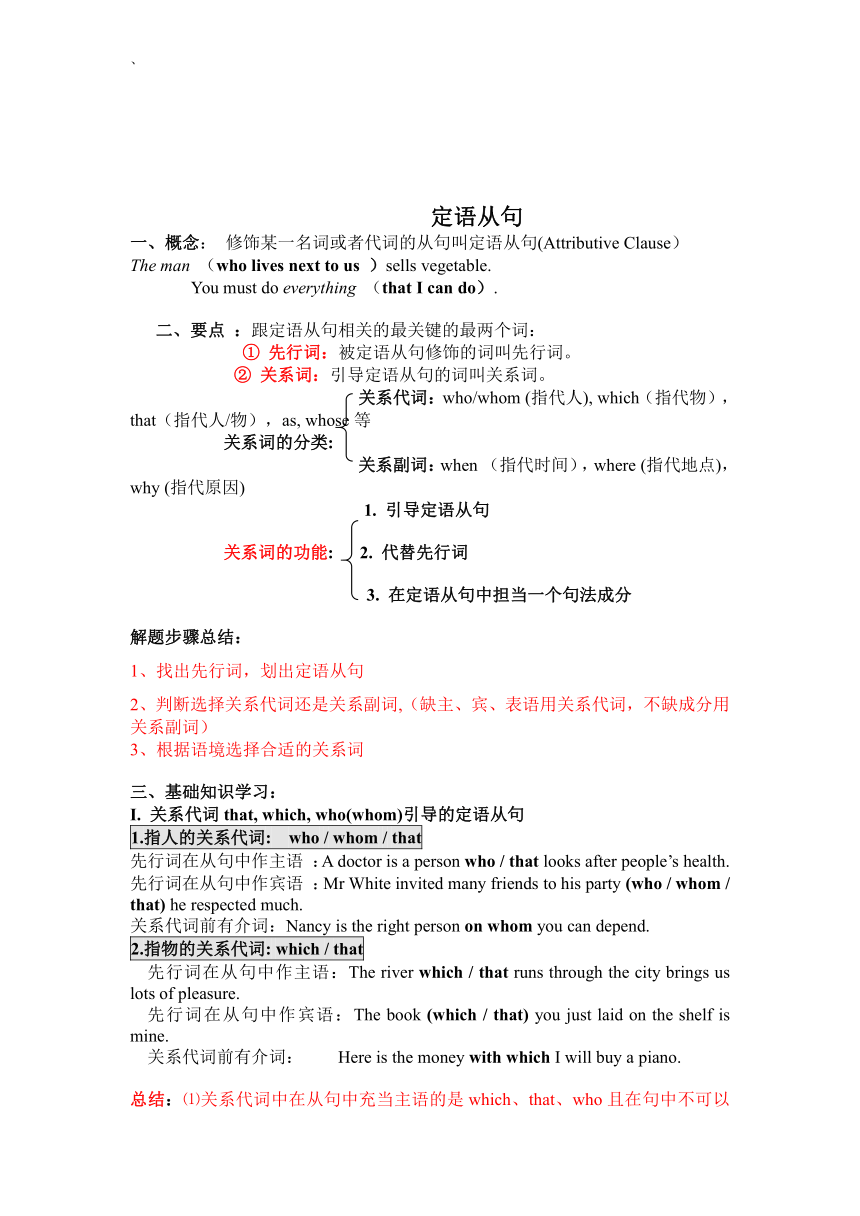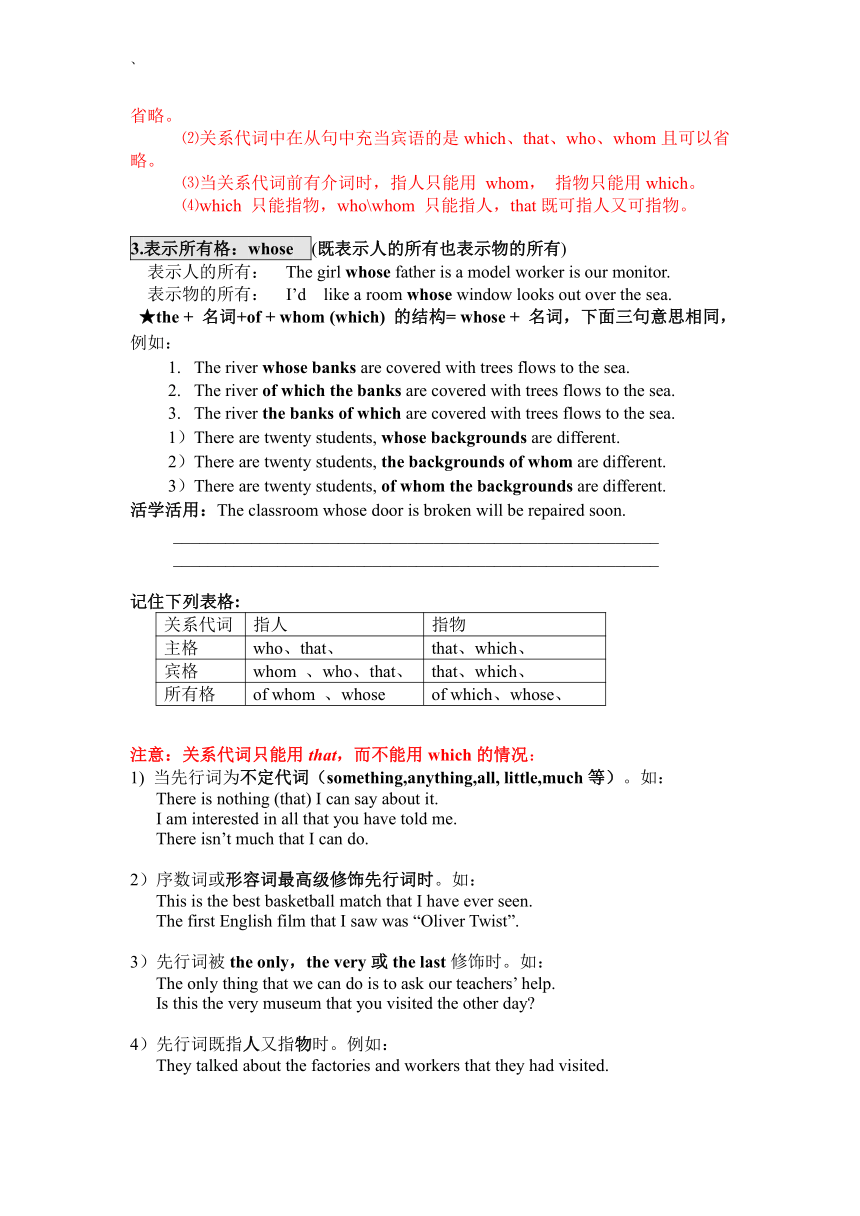2022届高考英语语法复习-定语从句学案(无答案)
文档属性
| 名称 | 2022届高考英语语法复习-定语从句学案(无答案) |

|
|
| 格式 | zip | ||
| 文件大小 | 43.9KB | ||
| 资源类型 | 教案 | ||
| 版本资源 | 通用版 | ||
| 科目 | 英语 | ||
| 更新时间 | 2022-02-19 16:03:30 | ||
图片预览




文档简介
英语教案
【高中】
年 级:高一
学生姓名:______
教师姓名:______
主 题 定语从句
教学目标 在阅读中能判断出定语从句 关系词的正确选择
教学重点 定语从句的关系词 限制性和非限制定从的区别
教学难点 1、正确判断先行词在从句中作何成分 2、as在定从中的正确使用
定语从句
一、概念: 修饰某一名词或者代词的从句叫定语从句(Attributive Clause)
The man (who lives next to us )sells vegetable.
You must do everything (that I can do).
二、要点 :跟定语从句相关的最关键的最两个词:
① 先行词:被定语从句修饰的词叫先行词。
② 关系词:引导定语从句的词叫关系词。
关系代词:who/whom (指代人), which(指代物),that(指代人/物),as, whose等
关系词的分类:
关系副词:when (指代时间),where (指代地点),why (指代原因)
1. 引导定语从句
关系词的功能: 2. 代替先行词
在定语从句中担当一个句法成分
解题步骤总结:
1、找出先行词,划出定语从句
2、判断选择关系代词还是关系副词,(缺主、宾、表语用关系代词,不缺成分用关系副词)
3、根据语境选择合适的关系词
三、基础知识学习:
I. 关系代词that, which, who(whom)引导的定语从句
1.指人的关系代词: who / whom / that
先行词在从句中作主语 :A doctor is a person who / that looks after people’s health.
先行词在从句中作宾语 :Mr White invited many friends to his party (who / whom / that) he respected much.
关系代词前有介词:Nancy is the right person on whom you can depend.
2.指物的关系代词: which / that
先行词在从句中作主语:The river which / that runs through the city brings us lots of pleasure.
先行词在从句中作宾语:The book (which / that) you just laid on the shelf is mine.
关系代词前有介词: Here is the money with which I will buy a piano.
总结:⑴关系代词中在从句中充当主语的是which、that、who且在句中不可以省略。
⑵关系代词中在从句中充当宾语的是which、that、who、whom且可以省略。
⑶当关系代词前有介词时,指人只能用 whom, 指物只能用which。
⑷which 只能指物,who\whom 只能指人,that既可指人又可指物。
3.表示所有格:whose (既表示人的所有也表示物的所有)
表示人的所有: The girl whose father is a model worker is our monitor.
表示物的所有: I’d like a room whose window looks out over the sea.
★the + 名词+of + whom (which) 的结构= whose + 名词,下面三句意思相同,例如:
The river whose banks are covered with trees flows to the sea.
The river of which the banks are covered with trees flows to the sea.
The river the banks of which are covered with trees flows to the sea.
There are twenty students, whose backgrounds are different.
There are twenty students, the backgrounds of whom are different.
There are twenty students, of whom the backgrounds are different.
活学活用:The classroom whose door is broken will be repaired soon.
________________________________________________________
________________________________________________________
记住下列表格:
关系代词 指人 指物
主格 who、that、 that、which、
宾格 whom 、who、that、 that、which、
所有格 of whom 、whose of which、whose、
注意:关系代词只能用that,而不能用which的情况:
1) 当先行词为不定代词(something,anything,all, little,much等)。如:
There is nothing (that) I can say about it.
I am interested in all that you have told me.
There isn’t much that I can do.
2)序数词或形容词最高级修饰先行词时。如:
This is the best basketball match that I have ever seen.
The first English film that I saw was “Oliver Twist”.
3)先行词被the only,the very或the last修饰时。如:
The only thing that we can do is to ask our teachers’ help.
Is this the very museum that you visited the other day
4)先行词既指人又指物时。例如:
They talked about the factories and workers that they had visited.
先行词被all, any, every, few, much,little, no,some等修饰时
I have read all the books that you gave me.
Any boy that wants to succeed must work hard.
6)当句中已有which或who时,为避免重复,多用that
Which is the book that he bought yesterday
Who that you have ever seen can beat him in the game
练习:
Egypt is a country ________is famous for its pyramids.
On the train I saw a student ___________was sleeping.
This is the book ________she gave me yesterday.
She is my mother _______the teacher is talking with now.
Is there anything ____ I can do for you
This is the best hotel _____I know.
Don’t stay in the room _____roof is under repair.
I know the boy _____ambition is to become a soldier.
The composer _____ ______ the teenagers are familiar has written many songs.
Mary lives in a large room, the door of _____opens east.
2. 关系副词where when why引导的定语从句
Do you remember the teahouse where we used to play chess (where=at which)
There was a time when there was no radio, TV or cinema. (when=during which)
The days are gone when he was an ignorant boy. (when=in which)
They didn’t explain the reason why they had canceled the rehearsal. (why=for which)
(定语从句中关系副词 = 介词 + 关系代词)
注意:有些先行词后面既可以用关系代词,也可以用关系副词。判断的重点在于分析先行词在定语从句中充当什么句子成分。 以the city 为例
(1) This is the city that/which I visited last year.
分析:主句:This is the city. 从句:I visited the city last year. visit:vt.,the city充当的成分:宾语
(2) This is the city where I lived last year.
分析:主句:This is the city. 从句:I lived in the city last year. live:vi.,the city 充当的成分:状语,表地点。
练习:
He took us to a small town _____he intended to settle down.
This is the small village _____I often visited when I was a child.
I will never forget the days ______we spent together last year.
I will never forget the days ______we stayed together last year.
This is the small hotel ______we stayed not long ago.
It is a factory _____his father worked a few years ago.
Can you tell the reason ______the car broke down
The reason _____he failed in the test is that he didn’t study hard.
Nobody believes the reason _______the worker explained for his carelessness in his work.
Do you know the reason ____ _____he was late
四、其他情况:
限制性定语从句与非限制性定语从句
限制性定语从句对先行词起限制作用,是先行词不可缺少的定语,如果去掉句子的意思不完整,不明确或失去意义。这种从句与主句的关系十分密切,写时不用逗号隔开。
I have found the key that I lost yesterday.
It happened at the time when I left.
非限制性定语从句和先行词的关系比较松散,只是对先行词作附加说明的作用。如果去掉,主句的意思仍然清楚,这种从句与主句之间常用逗号隔开。
He lives in Beijing, which is about five hours’ ride from here.
My cousin, who is an engineer, went to Europe last week.
His speech, which bored everyone, went on and on.
She is working hard,which everyone can see.
两者区别
区别 限制性定语从句 非限制性定语从句
形式 与主句之间不用逗号隔开 与主句之间一般用逗号隔开
功能 对先行词进行限定、修饰。如果去掉,剩余部分的意义便不完整、不明确 对先行词作附加说明,去掉后,句子剩余部分的意思仍然完整、明确
先行词 名词或名词性词组 名词、名词性词组或整个主句
引导词 所有的关系代词/副词 除that和why之外的关系代词/副词
翻译 常译成前置定语 常译成并列分句
【提示】 并非只有which才能引导非限制性定语从句。使用非限制性定语从句时,如果先行词指人,可用who,whom或whose来引导;先行词指物,可用which,whose来引导;先行词表时间或地点,可用when,where来引导(它们在从句中分别作时间状语和地点状语)。
总结:
非限制性定语从句不能用that引导
非限制性定语从句不能用why引导,要用for which代替why
I had told them the reason, for which I didn’t attend the meeting.
I had told them the reason why(for which) I didn’t attend the meeting.
在非限制性定语从句中,指人的关系代词作宾语时只能用whom,不能用who,也不能省略
Do you know Tom, whom we talked about
练习:
Chapin, _____has earned enough money, will start a new life.
The chairman, ____spoke first, sat on my right.
He must be from Africa, ____can be seen from his skin.
His sister has become a doctor, ______made their parents very proud.
Amy, _____father was a doctor, gave me a kind smile.
He will put off the picnic until May, _____he will be free.
No outdoor sports will be allowed tomorrow,_____the weather will be terrible.
He used to live in Canada, _____English is used to as the official language.
二、as在定语从句中的用法
1.as引导非限制性定语从句(和which的区别)
a. as引导非限制性定语从句时,先行词一般为整个主句;而which引导非限制性定语从句时,先行词既可以是整个主句又可以是主句的一部分。
b.as引导的从句位置比较灵活,可位于先行词之前、之中和之后,而which引导的从句仅能位于先行词之后。
As is known to all, the earth goes around the sun.
As was expected beforehand, the concert was very successful.
Bamboo is hollow, which makes it very high.
c.as引导从句时常译为“正如”,而which常译为“这;那”。常用句型有:as we all know,as is known to all,as everybody can see,as is expected等。
He did the experiment successfully,as had been expected.
正如期望的那样,他试验做得非常成功。
He failed in the experiment,which was unexpected.
他试验失败了,这是没有料到的。
2.as作关系代词的用法(用于固定结构中)常作主语或宾语
as引导的定语从句常出现于the same…as…,such…as…,as…as…和so…as…结构中,
解释为和...一样。
当定语从句的先行词被the same,such,as 或so修饰时,关系代词可选as,且不能省略。
Let’s meet at the same place as we did yesterday.让我们在和昨天碰面的同样的地方碰头吧。
I never heard such stories as he told. 我从未听过他所讲的那样的故事。
注意:★ the same…as… vs the same…that…
指代相似的人或物 指同一人或物
This is the same watch as I lost. Where did you buy it
This is the same watch that I lost. Please return it to me.
★ such…as… vs such…that…
It is such a difficult problem as no one can work out.
It is such a difficult problem that no one can work it out.
区别: as引导定语从句,指代的先行词在从句中充当成分,翻译成“像…那样”.
that引导状语从句,只起连接作用,翻译成“如此…以至于…”.
练习:
______has already pointed out, grammar is not a set of dead rules.
It is such a heavy stone _____as nobody can move.
This is the same watch ____ was worn by John.
_____is known to all, he is the bet student in our class.
He opposed the idea,_____could be expected.
三、以the way为先行词的定语从句通常由in which, that引导,也可以省略。
① I don’t like the way in which you speak to her.
② I don’t like the way that you speak to her.
③ I don’t like the way you speak to her.
、
1
【高中】
年 级:高一
学生姓名:______
教师姓名:______
主 题 定语从句
教学目标 在阅读中能判断出定语从句 关系词的正确选择
教学重点 定语从句的关系词 限制性和非限制定从的区别
教学难点 1、正确判断先行词在从句中作何成分 2、as在定从中的正确使用
定语从句
一、概念: 修饰某一名词或者代词的从句叫定语从句(Attributive Clause)
The man (who lives next to us )sells vegetable.
You must do everything (that I can do).
二、要点 :跟定语从句相关的最关键的最两个词:
① 先行词:被定语从句修饰的词叫先行词。
② 关系词:引导定语从句的词叫关系词。
关系代词:who/whom (指代人), which(指代物),that(指代人/物),as, whose等
关系词的分类:
关系副词:when (指代时间),where (指代地点),why (指代原因)
1. 引导定语从句
关系词的功能: 2. 代替先行词
在定语从句中担当一个句法成分
解题步骤总结:
1、找出先行词,划出定语从句
2、判断选择关系代词还是关系副词,(缺主、宾、表语用关系代词,不缺成分用关系副词)
3、根据语境选择合适的关系词
三、基础知识学习:
I. 关系代词that, which, who(whom)引导的定语从句
1.指人的关系代词: who / whom / that
先行词在从句中作主语 :A doctor is a person who / that looks after people’s health.
先行词在从句中作宾语 :Mr White invited many friends to his party (who / whom / that) he respected much.
关系代词前有介词:Nancy is the right person on whom you can depend.
2.指物的关系代词: which / that
先行词在从句中作主语:The river which / that runs through the city brings us lots of pleasure.
先行词在从句中作宾语:The book (which / that) you just laid on the shelf is mine.
关系代词前有介词: Here is the money with which I will buy a piano.
总结:⑴关系代词中在从句中充当主语的是which、that、who且在句中不可以省略。
⑵关系代词中在从句中充当宾语的是which、that、who、whom且可以省略。
⑶当关系代词前有介词时,指人只能用 whom, 指物只能用which。
⑷which 只能指物,who\whom 只能指人,that既可指人又可指物。
3.表示所有格:whose (既表示人的所有也表示物的所有)
表示人的所有: The girl whose father is a model worker is our monitor.
表示物的所有: I’d like a room whose window looks out over the sea.
★the + 名词+of + whom (which) 的结构= whose + 名词,下面三句意思相同,例如:
The river whose banks are covered with trees flows to the sea.
The river of which the banks are covered with trees flows to the sea.
The river the banks of which are covered with trees flows to the sea.
There are twenty students, whose backgrounds are different.
There are twenty students, the backgrounds of whom are different.
There are twenty students, of whom the backgrounds are different.
活学活用:The classroom whose door is broken will be repaired soon.
________________________________________________________
________________________________________________________
记住下列表格:
关系代词 指人 指物
主格 who、that、 that、which、
宾格 whom 、who、that、 that、which、
所有格 of whom 、whose of which、whose、
注意:关系代词只能用that,而不能用which的情况:
1) 当先行词为不定代词(something,anything,all, little,much等)。如:
There is nothing (that) I can say about it.
I am interested in all that you have told me.
There isn’t much that I can do.
2)序数词或形容词最高级修饰先行词时。如:
This is the best basketball match that I have ever seen.
The first English film that I saw was “Oliver Twist”.
3)先行词被the only,the very或the last修饰时。如:
The only thing that we can do is to ask our teachers’ help.
Is this the very museum that you visited the other day
4)先行词既指人又指物时。例如:
They talked about the factories and workers that they had visited.
先行词被all, any, every, few, much,little, no,some等修饰时
I have read all the books that you gave me.
Any boy that wants to succeed must work hard.
6)当句中已有which或who时,为避免重复,多用that
Which is the book that he bought yesterday
Who that you have ever seen can beat him in the game
练习:
Egypt is a country ________is famous for its pyramids.
On the train I saw a student ___________was sleeping.
This is the book ________she gave me yesterday.
She is my mother _______the teacher is talking with now.
Is there anything ____ I can do for you
This is the best hotel _____I know.
Don’t stay in the room _____roof is under repair.
I know the boy _____ambition is to become a soldier.
The composer _____ ______ the teenagers are familiar has written many songs.
Mary lives in a large room, the door of _____opens east.
2. 关系副词where when why引导的定语从句
Do you remember the teahouse where we used to play chess (where=at which)
There was a time when there was no radio, TV or cinema. (when=during which)
The days are gone when he was an ignorant boy. (when=in which)
They didn’t explain the reason why they had canceled the rehearsal. (why=for which)
(定语从句中关系副词 = 介词 + 关系代词)
注意:有些先行词后面既可以用关系代词,也可以用关系副词。判断的重点在于分析先行词在定语从句中充当什么句子成分。 以the city 为例
(1) This is the city that/which I visited last year.
分析:主句:This is the city. 从句:I visited the city last year. visit:vt.,the city充当的成分:宾语
(2) This is the city where I lived last year.
分析:主句:This is the city. 从句:I lived in the city last year. live:vi.,the city 充当的成分:状语,表地点。
练习:
He took us to a small town _____he intended to settle down.
This is the small village _____I often visited when I was a child.
I will never forget the days ______we spent together last year.
I will never forget the days ______we stayed together last year.
This is the small hotel ______we stayed not long ago.
It is a factory _____his father worked a few years ago.
Can you tell the reason ______the car broke down
The reason _____he failed in the test is that he didn’t study hard.
Nobody believes the reason _______the worker explained for his carelessness in his work.
Do you know the reason ____ _____he was late
四、其他情况:
限制性定语从句与非限制性定语从句
限制性定语从句对先行词起限制作用,是先行词不可缺少的定语,如果去掉句子的意思不完整,不明确或失去意义。这种从句与主句的关系十分密切,写时不用逗号隔开。
I have found the key that I lost yesterday.
It happened at the time when I left.
非限制性定语从句和先行词的关系比较松散,只是对先行词作附加说明的作用。如果去掉,主句的意思仍然清楚,这种从句与主句之间常用逗号隔开。
He lives in Beijing, which is about five hours’ ride from here.
My cousin, who is an engineer, went to Europe last week.
His speech, which bored everyone, went on and on.
She is working hard,which everyone can see.
两者区别
区别 限制性定语从句 非限制性定语从句
形式 与主句之间不用逗号隔开 与主句之间一般用逗号隔开
功能 对先行词进行限定、修饰。如果去掉,剩余部分的意义便不完整、不明确 对先行词作附加说明,去掉后,句子剩余部分的意思仍然完整、明确
先行词 名词或名词性词组 名词、名词性词组或整个主句
引导词 所有的关系代词/副词 除that和why之外的关系代词/副词
翻译 常译成前置定语 常译成并列分句
【提示】 并非只有which才能引导非限制性定语从句。使用非限制性定语从句时,如果先行词指人,可用who,whom或whose来引导;先行词指物,可用which,whose来引导;先行词表时间或地点,可用when,where来引导(它们在从句中分别作时间状语和地点状语)。
总结:
非限制性定语从句不能用that引导
非限制性定语从句不能用why引导,要用for which代替why
I had told them the reason, for which I didn’t attend the meeting.
I had told them the reason why(for which) I didn’t attend the meeting.
在非限制性定语从句中,指人的关系代词作宾语时只能用whom,不能用who,也不能省略
Do you know Tom, whom we talked about
练习:
Chapin, _____has earned enough money, will start a new life.
The chairman, ____spoke first, sat on my right.
He must be from Africa, ____can be seen from his skin.
His sister has become a doctor, ______made their parents very proud.
Amy, _____father was a doctor, gave me a kind smile.
He will put off the picnic until May, _____he will be free.
No outdoor sports will be allowed tomorrow,_____the weather will be terrible.
He used to live in Canada, _____English is used to as the official language.
二、as在定语从句中的用法
1.as引导非限制性定语从句(和which的区别)
a. as引导非限制性定语从句时,先行词一般为整个主句;而which引导非限制性定语从句时,先行词既可以是整个主句又可以是主句的一部分。
b.as引导的从句位置比较灵活,可位于先行词之前、之中和之后,而which引导的从句仅能位于先行词之后。
As is known to all, the earth goes around the sun.
As was expected beforehand, the concert was very successful.
Bamboo is hollow, which makes it very high.
c.as引导从句时常译为“正如”,而which常译为“这;那”。常用句型有:as we all know,as is known to all,as everybody can see,as is expected等。
He did the experiment successfully,as had been expected.
正如期望的那样,他试验做得非常成功。
He failed in the experiment,which was unexpected.
他试验失败了,这是没有料到的。
2.as作关系代词的用法(用于固定结构中)常作主语或宾语
as引导的定语从句常出现于the same…as…,such…as…,as…as…和so…as…结构中,
解释为和...一样。
当定语从句的先行词被the same,such,as 或so修饰时,关系代词可选as,且不能省略。
Let’s meet at the same place as we did yesterday.让我们在和昨天碰面的同样的地方碰头吧。
I never heard such stories as he told. 我从未听过他所讲的那样的故事。
注意:★ the same…as… vs the same…that…
指代相似的人或物 指同一人或物
This is the same watch as I lost. Where did you buy it
This is the same watch that I lost. Please return it to me.
★ such…as… vs such…that…
It is such a difficult problem as no one can work out.
It is such a difficult problem that no one can work it out.
区别: as引导定语从句,指代的先行词在从句中充当成分,翻译成“像…那样”.
that引导状语从句,只起连接作用,翻译成“如此…以至于…”.
练习:
______has already pointed out, grammar is not a set of dead rules.
It is such a heavy stone _____as nobody can move.
This is the same watch ____ was worn by John.
_____is known to all, he is the bet student in our class.
He opposed the idea,_____could be expected.
三、以the way为先行词的定语从句通常由in which, that引导,也可以省略。
① I don’t like the way in which you speak to her.
② I don’t like the way that you speak to her.
③ I don’t like the way you speak to her.
、
1
